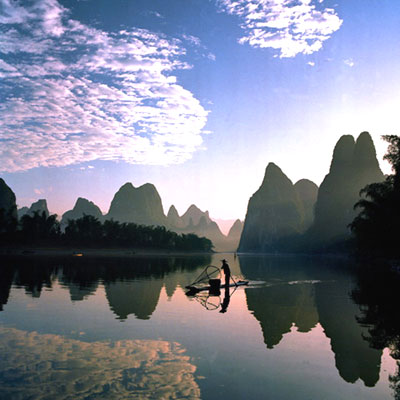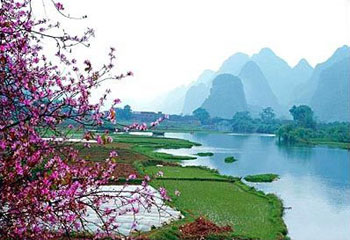| Tools: Save | Print | E-mail | Most Read |
| Tradition Meets Modernity |
| Adjust font size: |
Everything happening to
This port town, on the west bank of the Li River, was once a sleepy, easy-going place occupied by traders, farmers, and fishermen who docked their bamboo rafts and fishing boats along the wide river that snakes through town. First discovered as a tourist destination by western travelers in the 1980s, the town has grown steadily. It has been transformed into a tourist haven, with new apartment blocks, an underground shopping center, hotels and guesthouses, small and inexpensive eateries with western-style menus, local snack food outlets, and streets lined with souvenir shops. Arriving by night in a sleeper bus from the relatively flat eastern provinces, unusual shapes outside the window rise ominously against the skyline - dense shadows where the senses tell you no shadows ought to be. At first light the view from the hotel window is slightly surreal: a bustling town dwarfed by the nearby hills. But the initially disoriented visitor easily gains his bearings in the town. Yangshuo is small by Chinese standards, with a resident population of just 150,000. But the town has always drawn visitors, thanks to the odd rock formations of the surrounding countryside. These limestone pinnacles were created over 300 million years ago, when the whole region emerged from the seabed, exposing the rock to intense erosion from wind and rain. During a holiday week, the crowds along
Following the Winding and rutted dirt tracks lead down to the riverside where stretches of tall bamboo line the river, the lazy current taking tourists downstream on bamboo rafts. Water buffalo graze idly in the fields, closely watched by a young boy or an elderly man, the occasional flick of a stick or a well-aimed stone keeping the animals away from the neighboring pastures of lush grass. Just outside Yima, a small town close to the Down by the river, Deng Li and Zhang Feng are lowering bamboo rafts into the water from the back of a sputtering open-engine pick-up. A group of Chinese tourists clamor on the sandy banks, the children squirting each other with water pistols, and jumping around excitedly in anticipation of the boat ride. As they set off, the chug-chug sound of the truck's engine fades as it heads back downstream to collect more rafts, and bring them to this makeshift wharf. Five kilometers away, the town of Heading back along the main highway at dusk, there is the heady scent of rape flowers in the air and the thick, pungent odor of earth being worked over. The high pinnacles are once again becoming shadows; permanent shapes in the darkness that now seem reassuring rather than alien. Entering the outskirts of town, the signs of a society on the move slowly reappear - half-built homes, piles of masonry, the steady drone of activity - and although the fairy-light illuminations of the town center are a shock to the senses, they too prove to be somewhat reassuring. Life along the valley floor and in this rapidly growing town co-exist harmoniously- for the moment. (That's
|
| Tools: Save | Print | E-mail | Most Read |
 |
| Related Stories |
|
Product Directory China Search |
Country Search Hot Buys |

